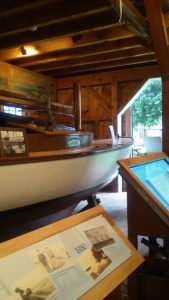
Last week at the New England Museum Association (NEMA) conference, I had the opportunity to attend an off-site session at the Osterville Historical Museum. The session, titled “Not Your Grandmother’s House Museum,” was about how to increase engagement of local communities at small historic sites. The Osterville Historical Museum is home to two historic homes and a boat shop with over a dozen wooden boats. After time exploring the boat shop, we were welcomed to one of the historic homes with warm protection from the rain and refreshments. Settling in for the conversation portion of the session, we learned the three key principles the historic site follows to guide interactions with their community. Called the 3 R’s, they are as follows:
- Relevance: the museum should be present with their community and understand current issues the community cares about. For the Osterville staff, this means being a part of every group in the village. Being present at those meetings builds support for the museum and shows the museum’s support for the whole community. While this level of involvement is only possible in museums in small communities, larger institutions should get involved as much as they can – what meetings is it most important for the museum to be present at?
- Resources: museums need to take a hard look at their resources before deciding what activities to participate in or initiate. What grants are available? Who do they have on their team and what skills do they offer? If staff is present at other community events and groups what resources do these two-way relationships bring to the table?
- Relationships: Who are all the people interacting with your museum? Volunteers, visitors, collaborators, funders, etc. How can you keep them engaged and maximize those relationships?
While these three points guide many of Osterville Historical Museum’s decisions, questions during the session raised a few final key points:
- Keep volunteers actively motivated and engaged. Make it a fun and supportive place where they can share their talents and connect with others in the community.
- Don’t overuse resources – keep in mind what your physical and human resources can handle and don’t push it. Long-term sustainability is key.
How can you apply these tips and guideposts to your museum? How do you effectively engage your communities while remaining sustainable?
![Paid Tech Studio Intern [Museum of Science, Boston, MA]](https://sites.tufts.edu/museumstudents/wp-content/themes/kale/sample/images/thumb4.jpg)

![Coordinator of School Partnerships and Teacher Programs [Museum of Fine Arts, Boston, Boston, MA]](https://sites.tufts.edu/museumstudents/wp-content/themes/kale/sample/images/full2.jpg)

